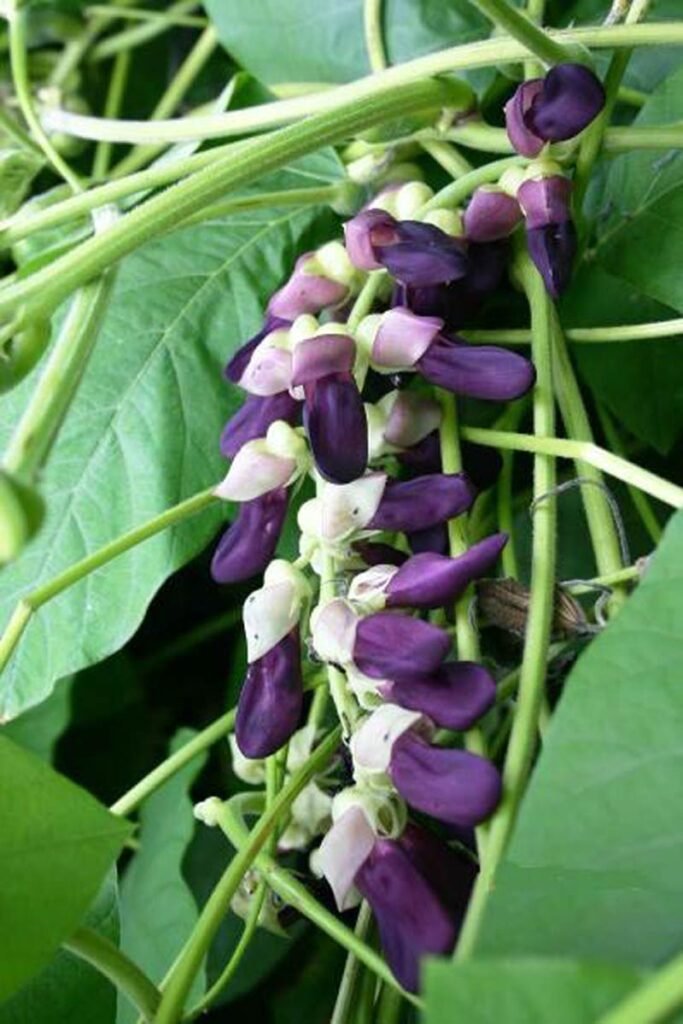
Botanical Name: Mucuna Pruriens
Kingdom: Plantae
Division: Magnoliophyta
Class: Magnoliopsida
Order: Fabales
Family: Fabaceace
Tribe: Phaseoleae
Genus: Mucuna
Species: Mucuna pruriens (L.) DC.
Popular Names: Cowitch, Cowhage Plant, Kavach, Kapikachhu, Atmagupta Naikaranam, Kawanch, Kewach
Parts Used: Roots, Seeds and Leaves
Habitat: This herb is an annual climbing shrub found in the tropics of India.
Description
Mucuna Pruriens is an annual, climbing shrub with long vines that can reach over 15 m. It bears white, lavender or purple flowers and pods that are covered in loose orange hair, which can cause a severe itch. The young plant is covered with fuzzy hair, but as it grows older, the hair disappears. The leaves of the plant are tripinnate, ovate, reverse ovate, rhombus shaped or widely ovate.
Plant Chemicals
The main plant chemicals found in velvet bean include alkaloids, alkylamines, arachidic acid, behenic acid, betacarboline, beta-sitosterol, bufotenine, cystine, dopamine, fatty acids, flavones, galactose d, gallic acid, genistein, glutamic acid, glutathione, glycine, histidine, hydroxygenistein, 5-hydroxytryptamine, isoleucine, l-dopa, linoleic acid, linolenic acid, lysine, mannose d, methionine, 6-methoxyharman, mucunadine, mucunain, mucunine, myristic acid, niacin, nicotine, oleic acid, palmitic acid, palmitoleic acid, phenylalanine, prurienidine, prurienine, riboflavin, saponins, serine, serotonin, stearic acid, stizolamine, threonine, trypsin, tryptamine, tyrosine, valine, and vernolic acid.
Uses and Benefits of Mucuna Pruriens
- The root of Mucuna Pruriens is used as a remedy in facial paralysis and nervous disorders.
- The decoction of its roots purifies blood; cures rheumatism, asthma, cough and stone in the bladder; and improves vitality. It is also used for treating fevers, edema and elephantiasis.
- In Central America, the seeds of the plant were roasted and ground to make coffee.
- In Brazil, Mucuna Pruriens is still grown as a food crop by indigenous people in Guatemala. The seeds are used internally, for treating Parkinson’s disease, edema, impotence, intestinal gas and worms.
- The plant is considered to posses the qualities of an aphrodisiac, nerve tonic and diuretic.
- Mucuna Pruriens is also brought in external use. It is locally applied to ulcers.
- The herb has a long history of being used in the Indian Ayurvedic medicine. It has been used for remedying worms, dysentery, diarrhoea, snakebite, sexual debility, cough, tuberculosis, impotence, rheumatic disorders, muscular pain, sterility, gout, menstrual disorders, diabetes and cancer.
- It is used as an important forage, fallow and green manure crop. As the plant belongs to the legume family, it is used for producing fertilizer and improving soil quality, with the help of nitrogen-fixing bacteria.
- Mucuna Pruriens is an extensively used fodder plant in the tropical countries. The whole plant is fed to the animals as silage, dried hay or dried seeds.
- The seeds of the plant have been found to possess anti-depressant properties, on consumption.
- The leaves of Mucuna Pruriens are dried and smoked sometimes.

